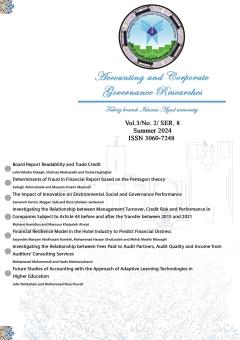The impact of innovation on environmental, social and governance performance
Subject Areas : Corporate governance
Samane Karimi
1
,
Mojgan Safa
2
*
![]() ,
Reza Gholami Jamkarani
3
,
Reza Gholami Jamkarani
3
![]()
1 - MSc. Student, Department of Accounting ,Qom Branch,Islamic Azad University,Qom ,Iran
2 - Assistant Prof., Department of Accounting, Ghom Branch،Islamic Azad University،Ghom،Iran
3 - Associate Prof. of Accounting Department, Qom Branch, Islamic Azad University, Qom, Iran
Keywords: environmental, social and governance performance, investment in innovation, Institutional theory,
Abstract :
Companies' focus on sustainability issues has increased significantly in recent years as a result of worsening environmental pollution and climate change crisis. The growing interest of companies in sustainability issues is also the result of social pressures to do this, as suggested by the institutional theory. Innovation is generally associated with environmental innovation in terms of environmental innovations or environmental design, which are among the tools that promote the development of a sustainable corporate culture. The purpose of this study is to investigate the relationship between investment in innovation and environmental, social and governance performance of the company. The analysis was done on a sample of 85 Tehran Stock Exchange companies from 2017 to 2022. This research is quantitative, descriptive, semi-experimental, library and correlational. Multivariate regression with year and industry fixed effects and Stata version 17 software have been used to test research hypotheses. The results show that companies that invest more in innovation show better environmental, social and governance performance than less innovative companies. These findings are consistent with the claim of institutional theory that companies that are more focused on sustainability issues recognize the importance of innovation in achieving these goals, leading to better corporate image and reputation.

